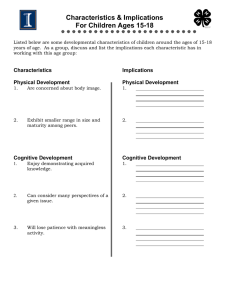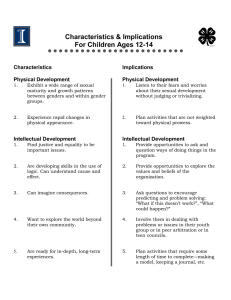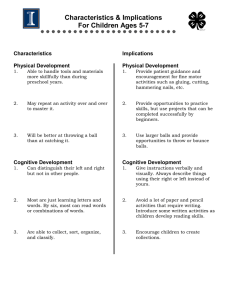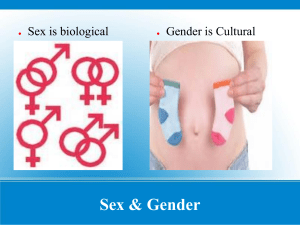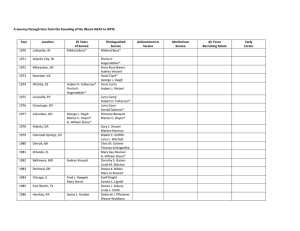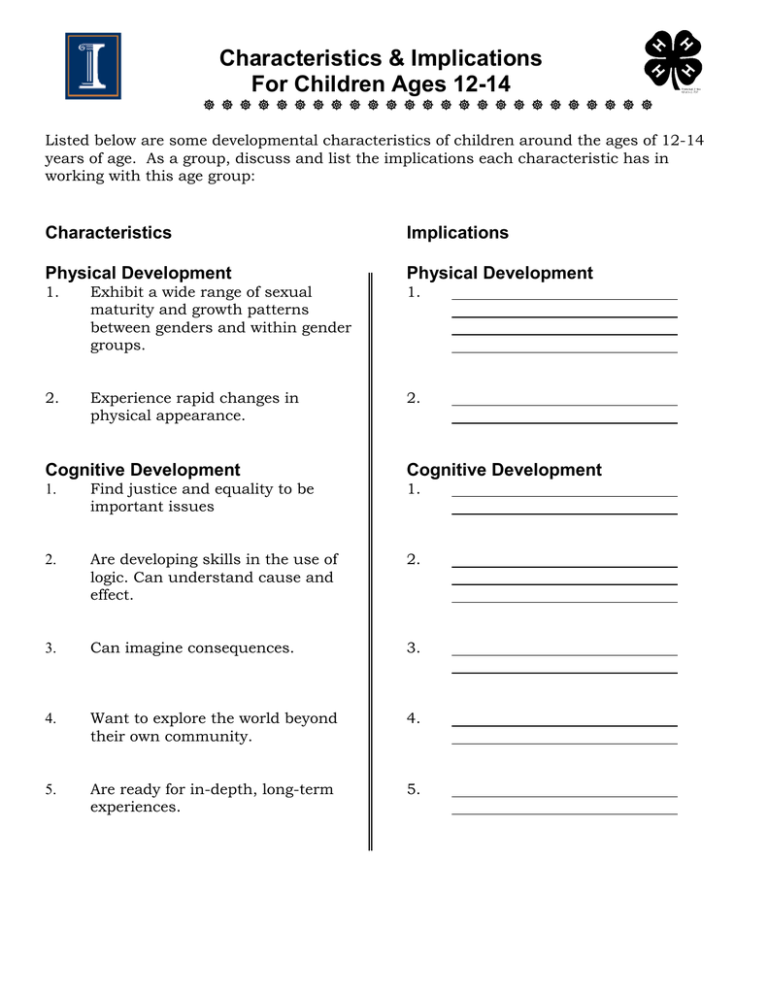
Characteristics & Implications
For Children Ages 12-14
Listed below are some developmental characteristics of children around the ages of 12-14
years of age. As a group, discuss and list the implications each characteristic has in
working with this age group:
Characteristics
Implications
Physical Development
Physical Development
1.
Exhibit a wide range of sexual
maturity and growth patterns
between genders and within gender
groups.
1.
2.
Experience rapid changes in
physical appearance.
2.
Cognitive Development
Cognitive Development
1.
Find justice and equality to be
important issues
1.
2.
Are developing skills in the use of
logic. Can understand cause and
effect.
2.
3.
Can imagine consequences.
3.
4.
Want to explore the world beyond
their own community.
4.
5.
Are ready for in-depth, long-term
experiences.
5.
Characteristics
Implications
Social Development
Social Development
1.
Are interested in activities involving
the opposite sex; learning to live
with opposite sex.
1.
2.
Are looking more to peers than
parents. Seek peer recognition.
2.
3.
Question authority and family
values.
3.
4.
Tend to reject ready-made solutions
from adults in favor of their own.
4.
Emotional Development
Emotional Development
1.
See themselves as always on center
stage.
1.
2.
Body changes can set up situations
of great embarrassment.
2.
3.
Strive for independence, yet want
and need parents help.
3.
4.
Seek privacy from parents/adults.
4.
Prepared By: Sheri Seibold, Extension Educator, Youth Development
July, 2001
State County Local Groups
US Department of Agriculture Cooperating
University of Illinois Extension provides equal opportunities in
programs and employment.
Characteristics & Implications
For Children Ages 12-14
Characteristics
Implications
Physical Development
Physical Development
1.
Exhibit a wide range of sexual
maturity and growth patterns
between genders and within gender
groups.
1.
Listen to their fears and worries
about their sexual development
without judging or trivializing.
2.
Experience rapid changes in
physical appearance.
2.
Plan activities that are not weighted
toward physical prowess.
Cognitive Development
Cognitive Development
1.
Find justice and equality to be
important issues.
1.
Provide opportunities to ask and
question ways of doing things in the
program.
2.
Are developing skills in the use of
logic. Can understand cause and
effect.
2.
Provide opportunities to explore the
values and beliefs of the
organization.
3.
Can imagine consequences.
3.
Ask questions to encourage
predicting and problem solving:
“What if this doesn’t work?”, “What
could happen?”
4.
Want to explore the world beyond
their own community.
4.
Involve them in dealing with
problems or issues in their youth
group or in peer arbitration or in
teen councils.
5.
Are ready for in-depth, long-term
experiences.
5.
Plan activities that require some
length of time to complete—making
a model, keeping a journal, etc.
Characteristics
Implications
Social Development
Social Development
1.
Are interested in activities involving
the opposite sex; learning to live
with opposite sex.
1.
Provide activities to be with the
opposite sex in healthy ways;
planning groups, parties, fund
raising activities, etc.
2.
Are looking more to peers than
parents. Seek peer recognition.
2.
Encourage involvement in teen
councils and planning boards.
3.
Question authority and family
values.
3.
Provide realistic parameters and
explain the reasons for them.
4.
Tend to reject ready-made solutions
from adults in favor of their own.
4.
Find time to talk with them
individually to help them work
through problems or to discuss
issues.
Emotional Development
Emotional Development
1.
See themselves as always on center
stage.
1.
Give them a chance to choose when
and if they are “on stage.”
2.
Body changes can set up situations
of great embarrassment.
2.
Plan activities that do not compare
one youth with another, but rather
help youth compare skills to their
own standards.
3.
Strive for independence, yet want
and need parents help.
3.
Avoid singling them out in front of
others either to commend or
criticize.
4.
Seek privacy from parents/adults.
4.
Provide opportunities to learn skills.
Prepared By: Sheri Seibold, Extension Educator, Youth Development
July, 2001
State County Local Groups
US Department of Agriculture Cooperating
University of Illinois Extension provides equal opportunities in
programs and employment.

